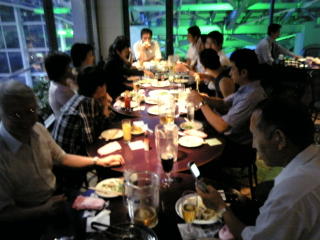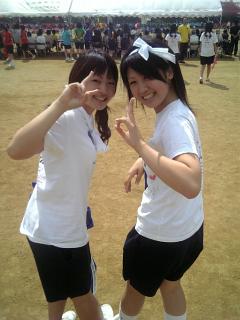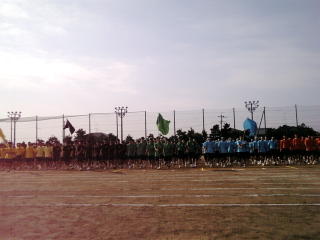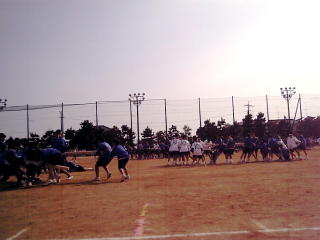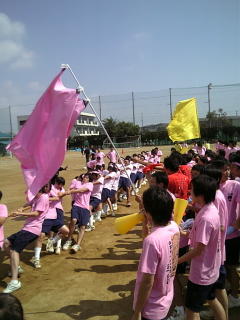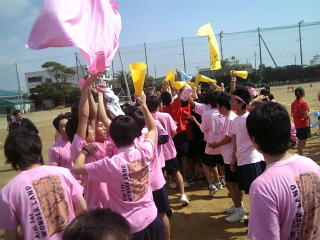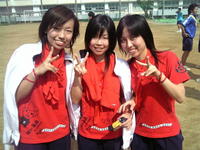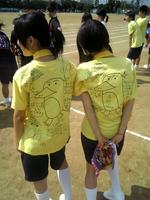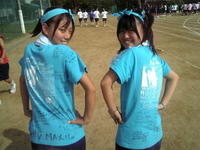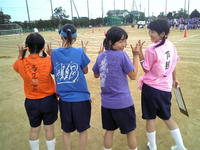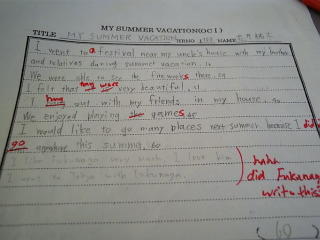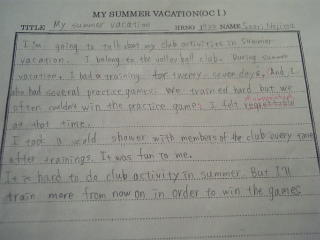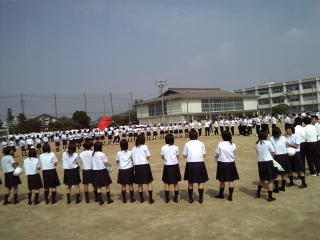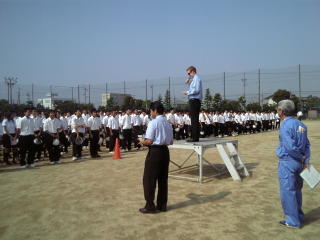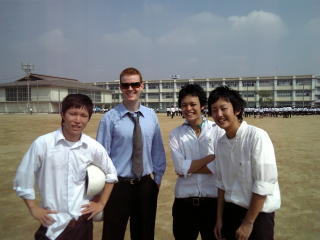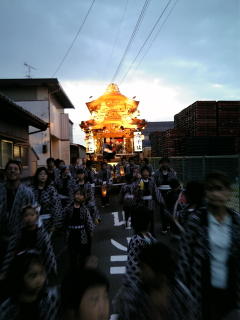
Though it happened only a few days after the sports festival, it has taken me nigh 2 weeks to work up the energy to write about this. Not for lack of enthusiasm about the topic, but more for lack of energy. Immediately after the festival I was rather incapacitated for the next few days due to the pairing of an enormous amount of concentrated drinking with surprisingly strenuous physical activity that the event entailed. After I recovered from that however, I had to prepare midterm examinations for my classes, which meant writing a test and recording all the parts. On top of this, I've been tutoring students after school, so I've found myself staying until around 6 every day lately. (the other teachers get a big kick out of me becoming "Japanese" in this way) So, I've actually been rather busy at school, and after biking home find myself rather exhausted.
Anyways, on the night of the welcoming party that I wrote about previously, one of the teachers - a really hilarious guy that sits next to me at school, (the older teacher in his 60's who does kendo) - invited me to participate in a yearly festival of his local shrine. I readily accepted, because though I've been to several festivals, he was actually inviting me to be
part of one, which would be quite a different experience, I imagined. According to the other teachers, he's never asked any of the other previous ALTs at the school (there have been about 5 before me), and actually, according to some other teachers, he never really likes to talk to anyone, be them ALT, Japanese or otherwise. For some reason, I made a good impression on him. (Probably the drinking)
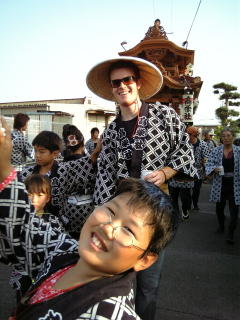
So I took the train out to Iwata City, about 15 minutes away from Hamamatsu, and met the teacher at the station for a day of "real Japanese culture". He lent me his brother's happi coat, gave me a big woven straw hat, and we were dropped off at the shrine by his wife. My basic information about what we would be doing is dragging the 神輿 (
mikoshi) or large portable shrine around town along with other community members, from about 9 am until maybe 9 at night. The teacher also had mentioned there might be drinking involved.
When we arrived at the shrine there were about 30 or so people milling about; old men standing together, joking around and speaking gruffly, younger men leaning against the walls smoking cigarettes, women chatting and yelling at the children chasing each other around the area. I was introduced to the guys, eliciting cries of what is surely my most common description here, でっかい!(
dekkai) - "HUGE!" (which sounds kind of insulting in English, but I have been assured is meant only in an impressed, complimentary fashion here) With those pleasantries finished with, one of the younger guys helped me get suited up in my happi coat, tying the belt up for me. I was then handed a beer immediately, and, though it was 9am and I hadn't really eaten anything yet, I thought, what the hell. I chugged it down, the teacher and I walked up to give a short prayer to the god at the shrine, (this was amusing in that the praying involves clasping your palms together and clapping, so I had to put my beer down right in front of the platform) and we all headed out back to where the mikoshi was set up.
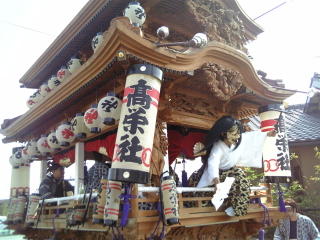
The mikoshi was about 3 stories tall. They are held between two poles and carried on the shoulders of the participants, or, as in this case, placed on a wheeled base and pulled with heavy ropes. Inside, ringed around the actual object ostensibly containing the kami, there are some kids playing the drums accompanied by a couple adults playing Japanese flutes. In the front, a masked and costumed person conducts a fan dance of sorts, insomuch as wild gesticulating with all four limbs while sitting down can be rightly considered a dance. The outside is lined with paper lanterns and decorate with elaborate wooden carvings. A railing running down both sides is manned with guys pushing, while a rope arcs out for about thirty feet from one side in front then back to the other, with people pulling (or, in most cases, merely carrying) the rope, distributing the work of a couple pack horses among 20 or 30 humans.
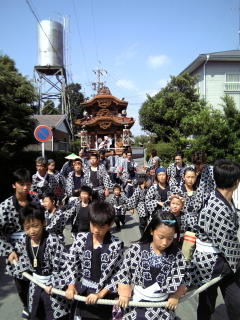
Despite the picture, which makes it look like some sort of child labor or Sisyphean endeavor, the whole procession is quite lively and fun. The music is going continuously and often the group breaks into some different chants that are, while not really understandable to me, gutteral and ambiguous enough that I can merely yell out unintelligible syllables along with the rest of the group. The people involved are all in good spirits; different members of the troupe coming up to chat with me the whole day. In fact, all I had to do was move further up or down the line to hang out with the different sections, since it was basically oldest at the back and youngest at the front. I talked with gruff old guys, the younger men and their girlfriends in the middle and the little kids at the front.

This little girl and I walked for a half hour or so together while she showed me the different magic tricks she had gotten earlier as prizes. I feigned amazement and worry that she had really lost her finger, made her promise not to scare me with the trick again, and lifted her up into the air by lifting up the rope.
Basically, we dragged the big shrine through the whole neighborhood, soliciting donations from locals. When someone who wanted to make a donation heard us coming by, they would walk outside and wave us down. At that point, the guy in charge of collecting donations would run over and stand next to the person in question, holding up a paper lantern. As we drew up to him or her, they would hand over whatever - either money, sake, or food - and their donation would be announced. The crowd would yell thank you, the music would restart, and we'd be back on the road. Sometimes instead of a donation, a house would have laid out tables with snacks and beer, and we'd sit down together for a break.

Otherwise, from the shrine, roughly located in the center of town, we fanned out to the south, returned and took a break, hit the east, then came back, and continuing in this way covered the whole area. This meant we had to navigate a lot of narrow streets and sometimes avoid overhanging telephone wires that would get snagged on the top of the mikoshi. Fortunately for us, we had a man behind the wheel - more accurately, crank - who did a stellar job of steering, despite the fact that he spent most of the trip making calls to his girlfriend on his cell phone. I got a little worried when he started steering while talking
and drinking a beer, two things that would be a bad idea driving a car, let alone several tons of antique wood and a
GOD, but he, and the rest of the crew, were unfazed.
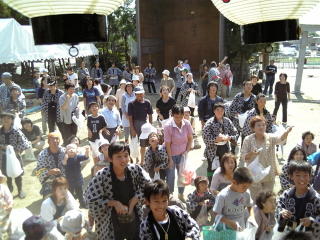
At the breaks we had meals and enjoyed performances of traditional dance and music. Another great event held at lunch was a sort of Halloween-esque candy free-for-all. Basically, hundreds of bags of candies, treats, and toys were loaded up into the mikoshi. Several people climb up into and on top of the portable shrine (including me) while children gather around with their bags. Then it's just a free for all for about 2 minutes as we throw out everything inside in every direction. The kids were waving widly at me to try to get me to toss something their way, but every time I tried to give it to one kid or throw it into someone's bag, I ended up inadvertantly hitting another in the face with a little cake. Then that fat kid who earlier ruined one of my pictures pushed his way to the front and lifted his pudgy arms up with his bag, demanding I feed his obsession. Trying to throw one into his bag, I instead plant one right in his face. Finding this hysterical, my new game was to throw 5 candies or cakes in rapid succession at this fat kid who, overwhelmed with his greed and hunger, grasped feebly at them all only to catch none, instead being pelted all over his bulbous form while his friends collected the candy (literally) on the rebound that should rightfully have been his. I am pretty sure I was laughing maniacally while doing this, but luckily nobody really knows what I'm thinking as a foreigner or how I am expected to behave, so they really have no basis for judgement or comparison.
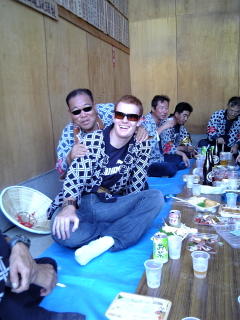
Did I mention the enormous amount of alcohol? First, every time we returned to the shrine for a break we were drinking beers or sake. Drinking also occured every time we stopped along the way at someone's house. In addition to this, the portable shrine had cases of beers stashed all along the railings as well as a giant cask of sake strapped to the side for us to take from freely. When I wasn't getting myself something to drink, someone was forcing something on me or filling up my glass without my notice, making it nearly impossible for me to gauge in any way how much drinking was really going on.
But, my guide being the older teacher from my school, I spent a majority of the day hanging out with the old guys, so I couldn't slouch off when it came to the drink. These guys loved to joke around and have a good time; they weren't uptight salarymen from Tokyo but normal working-class guys. Really, I was a bit nervous at first, not knowing anyone but the teacher and suddenly barging into a local festival, but these guys made me feel totally welcome. It wasn't just the normal conversations about where I'm from or how I like Japan, they actually just treated me like one of them, which, I realize, is the sort of community I have sometimes felt the acute lack of here (well, probably anywhere).
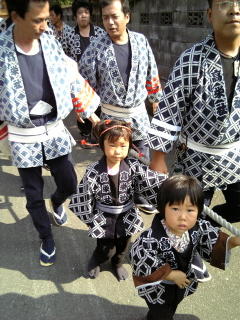
In the end, the shrine or religion aside - noting that in most cases the people involved don't fully know the historical or religious significance of the traditions here for Shinto or Buddhist festivals - this seems mostly to me to be a form of community building. The old Shinto religion was really the belief in different animistic gods which were centered in ones own particular village. There was no unifying belief system or nation-wide dogma. The gods were the property of each village or town, and, therefore, served as a way of branding the villagers as part of the same group. What I saw in this festival was the continuation of that idea, in which the god enshrined in this mikoshi is not as important as the fact that the townspeople pull the shrine
together, the rope being a very obvious symbol of this interconnectivity. All the people who might otherwise not meet each other come out, don their same outfits and are unified under their god and town. The little kids walk side by side with the village elders. By pulling the mikoshi, donating, or just by coming to watch, everyone confirms their place as part of this group. And, for all my intense individuality and isolation from others, it was nice to be allowed to pull my way in too, if just for that day.
 I went to Bangkok for five days during Christmas. I was surprised at how Thailand is in many ways similar to Mexico.
I went to Bangkok for five days during Christmas. I was surprised at how Thailand is in many ways similar to Mexico.
















